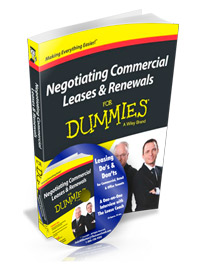By Jeff Grandfield and Dale Willerton
 Get Organized. Beginning the lease renewal process should start approximately nine – 12 months in advance for commercial tenants leasing retail or commercial space. In most cases, you should not need to exercise your Lease Renewal Option clause provided there has been a dialogue with your landlord and it has been established that the landlord wants you to stay for another term. Many Lease Renewal Option clauses include language that state, in no circumstances, can the rent go down if exercised – even if the fair market value has declined.
Get Organized. Beginning the lease renewal process should start approximately nine – 12 months in advance for commercial tenants leasing retail or commercial space. In most cases, you should not need to exercise your Lease Renewal Option clause provided there has been a dialogue with your landlord and it has been established that the landlord wants you to stay for another term. Many Lease Renewal Option clauses include language that state, in no circumstances, can the rent go down if exercised – even if the fair market value has declined.
Prepare for the Battle. When The Lease Coach begins to negotiate a lease renewal for a tenant, we first review the lease document, which was signed five or ten years ago. You may have provided a personal guarantee, letter of credit, deposit, etc., and these terms can be renegotiated during the lease renewal process. If you simply exercise your lease renewal option clause, often the rental rate will go up and the tenant will forego the opportunity to negotiate on other important terms.
If a rent reduction on a lease renewal is justified, either by a change in market rents for the area or a decline in sales revenues for the tenant, you should be prepared to show Profit and Loss statements. We also like to show the landlord industry articles, trends, or other supporting information about your industry and how it is doing in the marketplace.
Talk to Other Tenants in your Building. It’s a good idea to interview tenants to share information and to determine their future plans. If other tenants are not planning to renew their lease, thereby creating more vacant space in the property, you will have more leverage. If another tenant has renewed his/her lease, the rental rate he/she agreed to will likely factor into the rental rate the landlord expects you to pay.
 Create Competition for your Tenancy. So many commercial tenants go straight to their landlord regarding their lease renewal. At The Lease Coach, we like to create competition for our tenant clients. Instead of handing over your lease renewal to your landlord on a silver platter, we find alternative locations and solicit lease proposals from other landlords as a means of making your existing landlord re-earn your tenancy.
Create Competition for your Tenancy. So many commercial tenants go straight to their landlord regarding their lease renewal. At The Lease Coach, we like to create competition for our tenant clients. Instead of handing over your lease renewal to your landlord on a silver platter, we find alternative locations and solicit lease proposals from other landlords as a means of making your existing landlord re-earn your tenancy.
Approach Your Landlord and Your Property Manager. Confirm your landlord contact and make sure you are negotiating with the right person. You may have entered into the lease agreement negotiating with a commercial real estate agent or the landlord’s in-house representative; however, most lease agreements are negotiated with a property manager with whom you may or may not have a good, bad or otherwise relationship.
Get the Landlord’s Lease Proposal. We don’t believe in negotiating on the first date, but prefer to discuss and dialogue the lease renewal with the property manager and invite him/her to provide a lease proposal to the tenant. This puts us in a position to counter-offer and negotiate on behalf of the commercial tenant we are working for. Most of the negotiating process will take place verbally – but only after the lease renewal proposal, or document, has been provided.
Submit the Counter Offer to Your Landlord. Multiple counteroffers from both parties are part of the lease renewal process. Trying to slam-dunk the lease renewal too quickly will probably fail. We recently negotiated a lease renewal, deliberately slowing down the process and renegotiating every single term in the formal lease agreement that needed to be revisited.
Negotiate, Negotiate, Negotiate. Most commercial tenants are not negotiating to win at all…they are negotiating not to lose. The landlord and/or the landlord’s representatives are negotiating to win and you must do so as well. That might mean getting creative and thinking of different ways that this deal might work – perhaps it is free rent or tenant allowance if the landlord won’t budge on the rental rate. While we are negotiating, we will physically reveal the other offers which have come to me from other locations. Even if it is a more expensive deal, remember, that if you leave, the landlord gets a vacant property. He or she does NOT want that.

 Dale Willerton and Jeff Grandfield – The Lease Coach are Commercial Lease Consultants who work exclusively for tenants. Dale and Jeff are professional speakers and co-authors of Negotiating Commercial Leases & Renewals FOR DUMMIES (Wiley, 2013). Got a leasing question? Need help with your new lease or renewal? Call 1-800-738-9202 or visit
Dale Willerton and Jeff Grandfield – The Lease Coach are Commercial Lease Consultants who work exclusively for tenants. Dale and Jeff are professional speakers and co-authors of Negotiating Commercial Leases & Renewals FOR DUMMIES (Wiley, 2013). Got a leasing question? Need help with your new lease or renewal? Call 1-800-738-9202 or visit